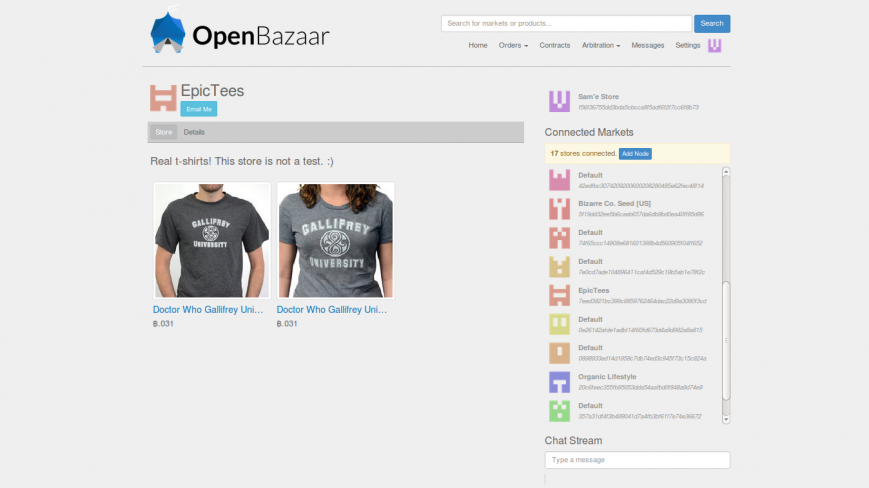OpenBazaar And OB1 To Launch By Thanksgiving 2015
[OpenBazaar](news/openbazaar-team-raises-1-million/) Project Lead Brian Hoffman has announced a release date for the Open Source marketplace platform, together with the first “value added” business built on top of it, [OB1](http://ob1.io/). The announcement was made during the [San Diego Bitcoin Meetup](https://youtu.be/19mUr86id2U), streamed live on July 16.
OpenBazaar uses peer to peer software to create a distributed network of buyers and sellers, who offer their goods and services directly to each other for Bitcoin. Shops are hosted on nodes, much like the nodes that make up the decentralized Bitcoin network.
Unlike Ebay and Amazon, there are neither middlemen to charge fees nor settle disputes. The platform will include a robust reputation system for all parties and the ability for anyone to become a dispute arbiter and get tipped for their time.
“Join the world on a mission of freedom. Freedom to purchase, sell, and trade.”
— – Open Bazaar
The Open Source project was started in April 2014 by Brian Hoffman, who based the platform off the hackathon-winning DarkMarket code by Amir Taaki. Since then, the project has taken off dramatically, capturing the attention of over 1,500 developers worldwide, with about 100 developers contributing code to date. In their Proof of Concept they had 2500 stores setup with about 600 items for sale.
On June 11, OpenBazaar received $1 million in funding from angel investor William Mougayar, who also sits on the Board of Directors for the first third party provider for the platform, OB1, as well as Union Square Ventures and Andreessen Horowitz.
The funds are being used to further develop the OpenBazaar core platform, inline with the projects road map. The team have all left their previous jobs to dedicate themselves full-time to the project, and will be adding new functionality while strengthening the system for a mainstream-ready client version.
OpenBazaar and OB1 share the same team members and collaborate on both the Open Source and for profit efforts. They are: Brian Hoffman, Chris Pacia, Mike Wolf, Nikolas Korasidis, Sam Patterson and Washington Sanchez.
“Now that several of the core devs (myself included) have formed a company and received funding, we’re changing our approach to development. We won’t be doing incremental releases every few months, but instead put out a larger version 1 release later this year.”
— – Sam Patterson, OpenBazaar Operations Lead
The plan to concentrate on one major release allows the developers to completely rework critical components to the system, including the networking, Distributed Hash Table (DHT), and User Interface (UI).
OB1 has released two new libraries for review already, one for the DHT and the other for User Datagram Protocol (UDP) networking. The prototype UI has received some major changes, as demonstrated during the release presentation, and can be tested on GitHub. The design is much improved from the previous Beta.
“Since we have limited time and resources, we’re dedicating it all towards making the new release something incredible.”
— – Sam Patterson
A walkthrough video demo for OpenBazaar Beta 5 has also been released. People who are willing to test existing code are free to do so, but the team won’t be making changes to the UI or fixing anything other than major bugs. Hoffman explained, “OpenBazaar is not a formal protocol but a set of rules that everyone who participates in the marketplace agrees to in order to do trade.”


The standalone company OB1, incorporated in Virginia, is currently the projects most complete third party provider. Pitched by Brian Hoffman as a value added service business built on top of OpenBazaar framework, OB1 will initially be focusing on 3 core aspects:
-
Hosting Solutions: A store running 24/7 would benefit from the uptime and scalability of being hosted in the cloud. OB1 is working with cloud server provider Digital Ocean, to provide an easy to use third party solution.
-
Arbitration Services: The company wants to provide standard contracts, that are legally enforceable in court, especially for higher end trades including real estate. They aim to provide a legal framework and different contract types for different needs, goods, and services.
-
Buyer Protection: OB1 is targeting opportunities in providing escrow services, as well as insurance for buyers and sellers.
One of the main concerns surrounding the OpenBazaar project is users trading in illegal goods, tempted by the fact that authorities won’t be able to snoop in due to the strong encryption used for messaging (Bitmessage), signing contracts (PGP), and digital currency. Authorities can’t request data related to activities that happen on the platform, as there is none being collected on a central server.
“OpenBazaar is not a company, is not a business, we don’t have servers sitting in some data centers collecting all this data and controlling our users… It’s just a bunch of computers talking to each other and what happens on that network is up to the whim of the users, which is kind of scary… There is a morality issue here I think because you are just unleashing this open thing to the internet and many people could go wild.”
— – Hoffman
Hoffman has stated that his team doesn’t endorse nor support the use of OpenBazaar for illicit purposes, and if that becomes a major trend on the platform he will be walking away from the project.
One of the investors in OB1, Brad Burnham has also expressed his opinion regarding this concern, although specific to the for profit side of the equation. “The best we can do is aggressively advocate for the responsible use of the OpenBazaar protocol, be open and transparent ourselves, and be an example for others.”
“OB1 will, of course, not knowingly offer its value added services to anyone using the OpenBazaar protocol to engage in illegal activities. The trickier question is how OB1 supports the development of an open protocol, one that they do not control, without encouraging, or endorsing, or even facilitating the misuse of that protocol.”
— – Brad Burnham, Union Square Ventures Managing Partner
While questions remain regarding possible illicit uses of OpenBazaar, it is currently impossible to be completely anonymous on the platform. IP addresses can’t be obfuscated, and integration of the anonymising network Tor is not on the top priority list.
The default identity in OpenBazaar is a set of cryptographic keys. For vendors the Ricardian contract behind a listing contains their identity. The details depend on what is chosen to associate the pseudonymous default identity with. By associating the “OpenBazaar ID” with a Onename Passcard it’s possible to provably associate social network accounts, and other details, with your client. Because of the open source nature of the platform third parties may also integrate other forms of identification.
For vendors there’s no real point in hiding identities, as buyers have to visit their nodes to access the listing and its contract. For buyers, the only identification disclosed within the contract is the bitcoin multisignature signing key used to control the escrow address. There is no ID, Passcard data or anything else to identify them.
Buyer privacy is pretty strong, while vendor privacy is dependent on whether they choose to associate their ID with other public info. Perhaps a more obvious point to consider is that a buyer will have to supply a shipping address for physical deliveries, although this clearly doesn’t affect digital assets, including stolen credit card details.
Built into the OpenBazaar platform is a reputation system which works similarly to the ones of centralized services like eBay and Amazon. If OpenBazaar scales to millions of users worldwide there would be an opportunity to tap into its decentralized reputation system, where buyers or sellers could join different marketplaces, and take their reputation across with them. This is something that is not possible with eBay or Amazon, and is an advantage that the OpenBazaar platform provides over the competition.
Powering this advantage is the Open Source nature of the platform, which allows anyone to build their own services using its API. This allows for third parties to build several, independent marketplaces.
The benefits that a decentralized, peer to peer marketplace, with no middlemen nor mandatory fees, could bring to the way we trade goods and services around the world may outweigh the negatives.
When presenting the world with an open platform with no restrictions the good needs to be taken with the bad. The first ever e-commerce transaction was a small drug deal made between Stanford and MIT students over 40 years ago through Arpanet. Had we shut down the Internet then we wouldn’t be able to experience the benefits it brought to society and commerce today.

Don’t miss out – Find out more today




